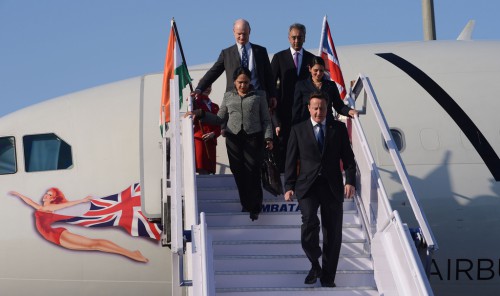The Prime Minister’s visit to India in February set a number of firsts: the first by a British PM to Mumbai for 20 years, the first by a PM to Amritsar, and the first to India (or anywhere) to be joined by over 120 businesspeople.
The size of the business group set us in Mumbai a huge range of challenges, and opportunities. The challenges were apparent from the moment the delegation arrived in their Virgin charter, with the task of getting such a large group (in some cases of some very senior executives) on to a bus! Someone remarked that some of the CEO’s probably hadn’t used a coach for years, but somehow we managed to get the entire group to the nearby Hindustan Unilever Building on time, and with no missing persons, together with the Prime Minister and 12 Ministers and parliamentarians.
During the course of the day in Mumbai the logistics became even more complex, with the business delegation scattering across the city, with some talking about Mumbai’s infrastructure to the Chief Minister, others visiting one of the Godrej Group’s impressive engineering facilities, and others again visiting the Health Minister or a local college. Somehow they all managed to converge on time on south Mumbai in the evening to attend a reception given by one of the most senior visiting CEO’s , Bob Dudley of BP, together with Mukesh Ambani, chair of Reliance Industries.
That occasion marked what was the single largest investment by any company in India, with BP announcing a further $3 -5bn in its joint venture to develop oil and gas fields off the East coast of India in the so-called K basin. This brings BP’s total investments into India to over $13bn, and has been by some way the most exciting and significant business development between our two countries since David Cameron visited India in 2010. Other big investments pursued during the PM’s visit included Diageo’s acquisition of parts of United Breweries spirits business, which will give the UK drinks giant a big heft in India, and BAe Systems continued work in the defence and aerospace sectors.
But of course not all the delegation represented Britain’s household names, and I’ll pick out just two companies to give a flavour of the range and size of businesses we supported in Mumbai. Privately owned OCS does not yet have the familiar ring of BP or Diageo’s Gordon’s Gin, but its range of cleaning, catering and security services touches millions of office and retail workers in the UK. I met the group’s CEO, Chris Cracknell, three years ago in Mumbai, when he was considering whether India was a market he should aim to develop. His enquiries have been answered in spades here, and his chairman was with the PM’s delegation to quietly note that the Group has now passed the 15,000 mark with its number of employees in India: some jump in three years!
Another, much smaller company I met, also three years ago, has manoeuvred its business so successfully here that its founder and md, Nigel Lang, was also invited to join the PM’s delegation. Flitabout’s Indian subsidiary Cutting Edge is offering a range of promotional support, especially in hair dressing salons, for a range of products, and the company has achieved a presence in over 2500 hairdressers serving India’s burgeoning middle class throughout the country – another great example of how perseverance here can bring real rewards.
A much smaller, but significant, group in the PM’s delegation were the senior representatives of some of India’s major investors in the UK, including Infosys, Polaris Technologies, and TCS. Between them these three groups account for major IT and BPO activities employing thousands across the UK. Their UK or Indian-based heads were invited to join a discussion with the Prime Minister and the cream of India’s businesspeople about the attractions of the UK for a base for Indian investment in Europe – we currently account for some 70 per cent of it.
TCS, one of the Tata Group’s star performers recently, also used the occasion of the Prime Minister’s visit to announce its support for a number of scholarships, the “Chevening TCS Scholarships”, for Indians to study cyber security technology, law and policy at a UK institute. This is another example of TCS’s close and growing links to Britain.
From gas fields off the coast of India to hair gels, office cleaning products and BPO services the PM’s delegation could hardly have covered a wider group of UK business interests while they were in Mumbai. As Sashi Mukundan, Head of country for BP India remarked as the delegation left India : “the Prime Minister’s visit offered a unique opportunity for our Group, and its CEO Bob Dudley, to underline our long term commitment to India – and to be alongside an extraordinarily diverse range of other UK-based companies, from multi-nationals to SMEs. I’m delighted we were able to use the visit, and our support with our partner Reliance Industries of the Egyptian Mummy exhibit with the British Museum, to help highlight our presence in India.”

